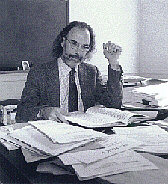
 The real story about witches
The real story about witches
Young girls dressed in pointed black hats and wielding
broomsticks almost assuredly will be walking the streets come
this Halloween. For their efforts, a knock on a door usually will
be greeted by a smiling face and a shower of candy and
treats.
The witch today, for the most part, is little
more than a Hollywood construct, like the werewolf or the mummy
risen from the dead. It is not something to be feared in the
normal course of the day's activities.
Such was not the case, however, for the witch
in medieval times. Back then, when a hail storm would destroy
crops or an infant died in his sleep, it was often believed by
common people that otherworldly forces were at play. The most
likely culprit was often the witch. A familiar tale would be that
of a witch who, in the form of a black cat, would stealthily
sneak into a child's bed and steal away his life-force.
Full story...
 Gene therapy fights prostate cancer in
trial
Gene therapy fights prostate cancer in
trial
Johns Hopkins cancer researchers report the successful use of
human gene therapy to activate the human immune system against
metastatic prostate cancer. The achievement, believed to be a
first, could have implications in the treatment of many kinds of
cancer. The study results are published in the Oct. 15 issue of
Cancer Research.
The Hopkins team injected a genetically
engineered cancer vaccine in 11 prostate cancer patients whose
cancer continued to spread following total surgical removal of
their prostate glands. "We were astounded to find that every part
of the immune system was alerted and turned on," says Jonathan
Simons, associate professor of oncology and urology and
principal investigator of this study, funded by the CaP Cure
Foundation, the National Cancer Institute and the Department of
Defense Prostate Cancer Initiative.
Full story...
| [ The Gazette | Search | About the Gazette | Send us Email ] |
The Gazette
 The Johns Hopkins University
The Johns Hopkins University
 Suite 100
Suite 100

3003 North Charles Street
 Baltimore, Maryland 21218
Baltimore, Maryland 21218
 (410) 516-8514
(410) 516-8514  gazette@resource.ca.jhu.edu.
gazette@resource.ca.jhu.edu.
